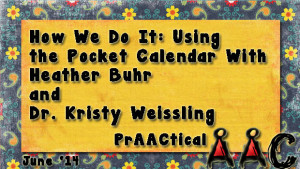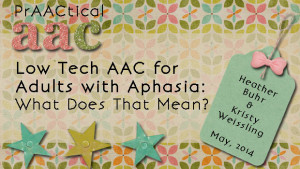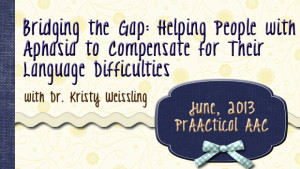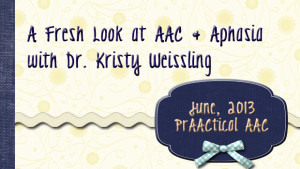Tag Archive: Kristy Weissling
December 1, 2014
by Carole Zangari -

We’re all so accustomed to seeing grid-based displays that sometimes we have to make a concerted effort to consider other options. Visual scene displays (VSDs) are a great option for some clients with AAC needs. Here are some resources that may be helpful if you’re considering using them with one of your prAACtical friends. Visual Scene Manual by Drs. Kristy Weissling and David Beukelman Visual Scene Templates for communication books Augmentative Communication News issue on VSD’s Jane Farrall’s SlideShare presentation on VSD’s Visual Scene Display webcast
Filed under: PrAACtical Thinking
Tagged With: Augmentative Communication News, David Beukelman, Jane Farrall, Kristy Weissling, visual scene display, VSD
June 12, 2014
by Carole Zangari -

We are happy to welcome back our friend and colleague, Dr. Kristy Weissling, and her student Heather Buhr, who are sharing more information about an AAC tool they are using to support people with aphasia. Take a look at their Pocket Calendars, which may be beneficial to clients with other kinds of communication difficulties as well. You can see their original post, Low-Tech AAC for Adults with Aphasia, here. ::::::::::::::::::::::::::::::::::::::::::::::::::::::::::::::::::::::::::::::::::: In our last post we examined the differences between memory books and communication books. As promised, we are back again to share with you a low-tech “device” that we have been recently using- the pocket calendar. It’s simple, easy to use, comes together in a snap, and is probably familiar to your clients. We will review how our clients are using these pocket calendars, why we find them effective, and how to put one... [Read More...]
Filed under: PrAACtical Thinking
Tagged With: aphasia, communication book, Heather Buhr, Kristy Weissling, Pocket Calendar
May 27, 2014
by Carole Zangari -

Aphasia Awareness Month is just around the corner, and getting us ready for that is this wonderful post on using low tech AAC with people who have aphasia. We’re delighted to welcome back our friend and colleague, Dr. Kristy Weissling, who is collaborating with Heather Buhr, to share some thoughts on this topic. ::::::::::::::::::::::::::::::::::::::::::::::::::::::::::::: For many, the term Augmentative and Alternative (AAC) brings to mind technology, speech-generating devices, and now – more than ever before – iPads. But as we know, AAC encompasses much more than that. We all use AAC when we make facial expressions or gestures, use symbols or pictures, or write. We would like to explore AAC and more “low-tech” options that help our clients express their thoughts, needs, wants, and ideas. Low-tech strategies can range from the use of written choice, to communication boards, to communication books. In this article we will specifically address communication... [Read More...]
Filed under: PrAACtical Thinking
Tagged With: aphasia, communication book, Heather Buhr, Kristy Weissling, low tech
June 26, 2013
by Carole Zangari -

We’re wrapping up Aphasia Month with another fine post from Dr. Kristy Weissling. You can see her earlier posts here and here. In this post, Kristy shares her thoughts on how SLPs can use AAC supports to help individuals with aphasia compensate for their language difficulties. In 2010, my colleague, Carrie Prentice, and I talked about the role of both remediation and compensation in the speech rehabilitation programs of people with aphasia. At that time, we were trying to emphasize that at any particular time in the rehabilitation process, from acute care to outpatient rehabilitation, all possible alternatives should be balanced to create an individualized treatment program. Both restorative and compensatory mechanisms are available to therapist throughout this process. We proposed the work of Dixon, Garrett, and Backman (2008) to formulate a framework for discussing compensation. Six mechanisms of compensation were identified in their chapter on principles of compensation in... [Read More...]
Filed under: PrAACtical Thinking
Tagged With: aphasia, EBP, evidence, Kristy Weissling
June 17, 2013
by Carole Zangari -

We’re so pleased to be able to share the thoughts of our friend and colleague, Dr. Kristy Weissling, on providing AAC supports to people with aphasia. She received her professional doctorate from Nova Southeastern University and is currently an Assistant Professor of Practice and clinical supervisor at the Barkley Speech-Language and Hearing Clinic at the University of Nebraska-Lincoln. Her research and teaching interests include, aphasia, cognitive communication impairments, and AAC. She participates in implementation of a portion of the RERC grant project at the University of Nebraska-Lincoln. She has been an instructor in aphasia and cognitive linguistic impairments for 15 years and teaches in both online and live formats. Her clinical load includes individual and group treatment of individuals with aphasia, traumatic brain injury, and early cognitive decline. In this post, Kristy reflects on three articles that have shaped her clinical services and teaching. :::::::::::::::::::::::::::::::::: I have been working with people who... [Read More...]
Filed under: PrAACtical Thinking
Tagged With: aphasia, EBP, Fresh Look, Kristy Weissling, research




